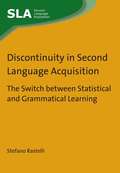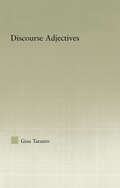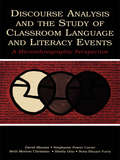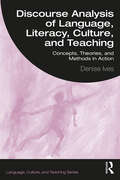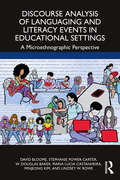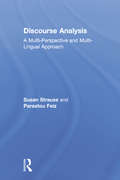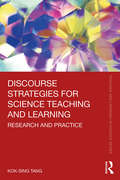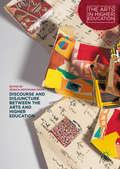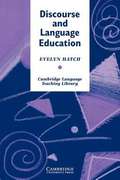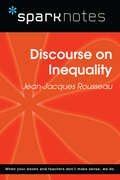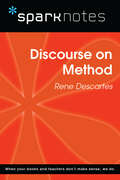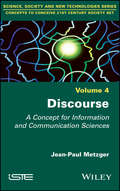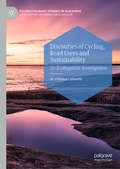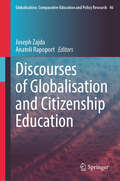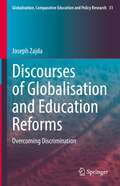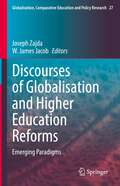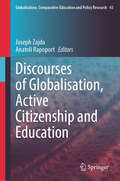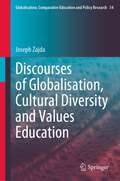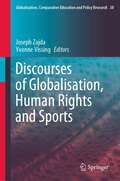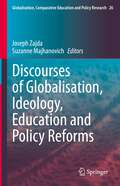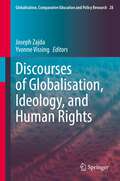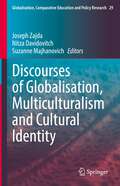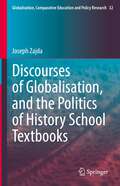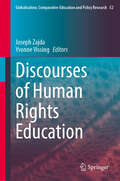- Table View
- List View
Discontinuity in Second Language Acquisition
by Stefano RastelliWith a particular focus on the morphosyntactic features of second language, this book discusses the idea that language acquisition is a discontinuous and 'quantized' process and thus that some items might be learned twice, statistically and grammatically. It argues that the switch from one way of learning to another is statistically-driven and grammatically motivated. The volume brings together and discusses insights and evidence from learner corpora analysis and electrophysiological data in an attempt to provide the reader with a unified outlook and it suggests a new, developmentally-oriented interpretation of findings. The topics discussed will be of interest to researchers working in the field of psycho- and neurolinguistics and SLA.
Discourse Adjectives
by Gina TarantoFirst Published in 2006. Routledge is an imprint of Taylor & Francis, an informa company.
Discourse Analysis and the Study of Classroom Language and Literacy Events: A Microethnographic Perspective
by David Bloome Stephanie Power Carter Beth Morton Christian Sheila Otto Nora Shuart-FarisThe authors present a social linguistic/social interactional approach to the discourse analysis of classroom language and literacy events. Building on recent theories in interactional sociolinguistics, literary theory, social anthropology, critical discourse analysis, and the New Literacy Studies, they describe a microethnographic approach to discourse analysis that provides a reflexive and recursive research process that continually questions what counts as knowledge in and of the interactions among teachers and students. The approach combines attention to how people use language and other systems of communication in constructing classroom events with attention to social, cultural, and political processes. The focus of attention is on actual people acting and reacting to each other, creating and recreating the worlds in which they live. One contribution of the microethnographic approach is to highlight the conception of people as complex, multi-dimensional actors who together use what is given by culture, language, social, and economic capital to create new meanings, social relationships and possibilities, and to recreate culture and language. The approach presented by the authors does not separate methodological, theoretical, and epistemological issues. Instead, they argue that research always involves a dialectical relationship among the object of the research, the theoretical frameworks and methodologies driving the research, and the situations within which the research is being conducted. Discourse Analysis and the Study of Classroom Language and Literacy Events: A Microethnographic Perspective: *introduces key constructs and the intellectual and disciplinary foundations of the microethnographic approach; *addresses the use of this approach to gain insight into three often discussed issues in research on classroom literacy events--classroom literacy events as cultural action, the social construction of identity, and power relations in and through classroom literacy events; *presents transcripts of classroom literacy events to illustrate how theoretical constructs, the research issue, the research site, methods, research techniques, and previous studies of discourse analysis come together to constitute a discourse analysis; and *discusses the complexity of "locating" microethnographic discourse analysis studies within the field of literacy studies and within broader intellectual movements. This volume is of broad interest and will be widely welcomed by scholars and students in the field language and literacy studies, educational researchers focusing on analysis of classroom discourse, educational sociolinguists, and sociologists and anthropologists focusing on face-to-face interaction and language use.
Discourse Analysis of Language, Literacy, Culture, and Teaching: Concepts, Theories, and Methods in Action (Language, Culture, and Teaching Series)
by Denise IvesAn essential text on discourse theory and analytic methods, this book demonstrates the possibilities of using discourse analysis to better understand language, literacy, culture, and teaching. Each chapter provides coherent, extended examples of individuals engaged in the process of doing discourse analysis. The narrative approach highlights the individual experiences of the discourse analysts and provides a unique, inside-the-mind view of the process and choices along the way. Across the book, stories describe processes involved in analyses, including identifying aims, formulating questions, selecting discourse, transcribing oral and multimodal discourse, translating discourse, chunking discourse, choosing and applying discourse and other theory, generating and supporting claims, and communicating findings. Chapters also feature sidebars with key theories and methods, recommended readings, and additional resources. This book is ideal for courses on discourse analysis, qualitative research, or language, literacy, culture, and teaching. Readers are invited to imagine the possibilities for using discourse analysis to answer their own questions.
Discourse Analysis of Languaging and Literacy Events in Educational Settings: A Microethnographic Perspective
by Minjeong Kim David Bloome Maria Lucia Castanheira Stephanie Power-Carter W. Douglas Baker Lindsey W. RoweThis book provides a comprehensive introduction to the use of microethnographic discourse analysis for researching, theorizing, and reconceptualizing the uses of language and literacy in educational settings. The authors apply an ethnographic perspective to discourse analysis to emphasize how teachers and students use spoken and written language to construct knowledge, opportunities for learning, and social relationships. The authors demonstrate how microethnographic discourse analysis at different levels of scale can provide deeper understandings into the nuanced, complex social interactions and relationships that exist in and across educational contexts, including meaning-making, literacy practices, power relations, and the social construction of personhood. Each chapter offers philosophically and theoretically grounded principles for using microethnographic discourse analysis and example cases that reflect the principles presented. Ideal for researchers, teacher educators, and teachers, this essential text on discourse analysis, languaging, and literacy provides a grounding to further examine critical questions challenging educators.
Discourse Analysis: Putting Our Worlds into Words
by Susan Strauss Parastou FeizThis introductory textbook presents a variety of approaches and perspectives that can be employed to analyze any sample of discourse. The perspectives come from multiple disciplines, including linguistics, sociolinguistics, and linguistic anthropology, all of which shed light on meaning and the interactional construction of meaning through language use. Students without prior experience in discourse analysis will appreciate and understand the micro-macro relationship of language use in everyday contexts, in professional and academic settings, in languages other than English, and in a wide variety of media outlets. Each chapter is supported by examples of spoken and written discourse from various types of data sources, including conversations, commercials, university lectures, textbooks, print ads, and blogs, and concludes with hands-on opportunities for readers to actually do discourse analysis on their own. Students can also utilize the book’s comprehensive companion website, with flash cards for key terms, quizzes, and additional data samples, for in-class activities and self-study. With its accessible multi-disciplinary approach and comprehensive data samples from a variety of sources, Discourse Analysis is the ideal core text for the discourse analysis course in applied linguistics, English, education, and communication programs.
Discourse Strategies for Science Teaching and Learning: Research and Practice (Teaching and Learning in Science Series)
by Kok-Sing TangThis engaging and practical volume looks at discourse strategies and how they can be used to facilitate and enhance science teaching and learning within the classroom context, offering a synthesis of research on classroom discourse in science education as well as practical discourse strategies that can be applied to the classroom. Focusing on the connection between research and practice, this comprehensive guide unpacks and illustrates key concepts on the role of discourse in students’ thinking and learning based on empirical analysis of real conversations in a number of science classrooms. Using real-life classroom examples to extend the scope of research into science classroom discourse begun during the 1990s, Kok-Sing Tang offers original discourse strategies as explicit methods of using discourse to engage in meaning-making and work towards a specific instructional goal. This volume covers new and informative topics including how to use discourse to: Establish classroom activity and interaction Build and assess scientific content knowledge Organize and evaluate scientific narrative Enact scientific practices Coordinate the use of multimodal representations Building on more than ten years of research on classroom discourse, Discourse Strategies for Science Teaching and Learning is an ideal text for science teacher educators, pre-service science teachers, scholars, and researchers.
Discourse and Disjuncture between the Arts and Higher Education
by Jessica Hoffmann Hoffmann DavisThis accessible and compelling collection offaculty reflections examines the tensions between the arts and academics andoffers interdisciplinary alternatives for higher education. With an eye toteacher training, these artist scholars share insights, models, and personalexperience that will engage and inspire educators in a range of post-secondarysettings. The authors represent a variety of art forms, perspectives, andpurposes for arts inclusive learning ranging from studio work to classroomteaching to urban settings in which the subject is equity and social justice. From the struggles of an arts concentrator at an Ivy League college to thechallenge of reconciling the dual identities as artists and arts educators, theissues at hand are candid and compelling. The examples of discourse rangingfrom the broad stage of arts advocacy to an individual course or program givetestimony to the power and promise of the arts in higher education.
Discourse and Language Education (Cambridge Language Teaching Library)
by Evelyn HatchDiscourse analysis is the study of how communication--spoken and written--is structured so that it is socially appropriate and linguistically accurate. <P><P>This book gives practical experience in analyzing discourse. It includes analyses of spoken language--conversations, classroom interactions, speech events, and scripts--and written language--from formal rhetorical structures of composition to the informal style of personal letters. <P>Because the organization of discourse differs across languages, example data are drawn from native speakers and language learners of all ages, backgrounds, and proficiency levels. Thus, Discourse and Language Education will be of great interest to teachers of ESL/EFL, foreign language teachers, and special education teachers, especially those working with the hearing impaired.
Discourse on Inequality (SparkNotes Philosophy Guide)
by SparkNotesDiscourse on Inequality (SparkNotes Philosophy Guide) Making the reading experience fun! SparkNotes Philosophy Guides are one-stop guides to the great works of philosophy–masterpieces that stand at the foundations of Western thought. Inside each Philosophy Guide you&’ll find insightful overviews of great philosophical works of the Western world.
Discourse on Method (SparkNotes Philosophy Guide)
by SparkNotesDiscourse on Method (SparkNotes Philosophy Guide) Making the reading experience fun! SparkNotes Philosophy Guides are one-stop guides to the great works of philosophy–masterpieces that stand at the foundations of Western thought. Inside each Philosophy Guide you&’ll find insightful overviews of great philosophical works of the Western world.
Discourse, Dialogue and Technology Enhanced Learning
by Rachel PilkingtonDiscourse, Dialogue and Technology Enhanced Learning is invaluable to all those wanting to explore how dialogic processes work and how we facilitate them. Dialogue is an important learning tool and it is by understanding how language affects us and how we use language to encourage, empathise, inquire, argue and persuade that we come closer to understanding processes of change in ourselves and our society. Most researchers in Education will find themselves interpreting some form of data in the form of words; whether these words be explanations, conversations, narrations, reflections, debates or interviews and whether they are conducted through digital media or face-to-face. Discourse, textual or spoken, is therefore central to researching education. Each chapter focuses on the ways in which alternative levels of discourse analysis provide tools for the researcher, enabling insights into the way language works in learning, teaching practice and wider society. Drawing on the author's own 'DISCOUNT' discourse analysis coding scheme and including a wide range of dialogue examples, this book covers: Why Dialogue? The Role of Dialogue in Education. Debate: Learning to Argue and Arguing to Learn Towards Meaning-Making: Inquiry, Narrative and Experience The Role of the Significant Other: Facilitation, Scaffolding and Mediation Inclusion, Collaboration and Community Media, Mode and Digital Literacy Researching Voices and Texts Discourse, Dialogue and Technology Enhanced Learning will be an essential resource for all students, educators and educational researchers who have an interest in the role of discourse in educational contexts.
Discourse: A Concept for Information and Communication Sciences
by Jean-Paul MetzgerDiscourse is not just a means of expressing thought; it is also an autonomous body, an act through which we aim to achieve a certain effect. Modern linguistics proposes a broader definition of discourse, as a discrete and unique enunciative process, where the speaker or author makes language concrete through speech (in the Saussurian sense), and describes the various acts (oral, illocutionary, perlocutionary) that discourse performs. This book examines discourse, an object of analysis and criticism, from a wide range of perspectives. Among the concepts explored are the contributions of rhetoric in the art of discourse, the evolution of multiple approaches and the main methods of discourse analysis conducted by a variety of researchers. The book deepens our knowledge and understanding of discourse, a concept on which any research related to information and communication can be based.
Discourses of Cycling, Road Users and Sustainability: An Ecolinguistic Investigation (Postdisciplinary Studies in Discourse)
by M. Cristina CaimottoThis book employs a Critical Discourse Studies (CDS) framework to examine cycling mobility, marking a new turn in ecolinguistic discourse analysis. The author focuses specifically on environment-related arguments concerning the promotion of higher levels of cycling, mainly as a means of transport, and investigates the “US vs. “THEM” narratives present in many discourses about road users. Analysing newspaper articles, institutional documents and spoken interviews, the author searches for a positive new discourse that would inspire and encourage cycling as a habitual means of transport, rather than simply exposing ecologically destructive discourse. The book will be of interest to discourse and ecolingusitics scholars, as well as contributing to the lively debate about how to increase cycling in fields such as sustainability, sociology, transport planning and management.
Discourses of Globalisation and Citizenship Education (Globalisation, Comparative Education and Policy Research #46)
by Joseph Zajda Anatoli RapoportThis book analyses dominant discourses of globalisation and citizenship in schools. It focuses on topics such as the impact of technology on inquiry in citizenship education and global citizenship teacher education through collaborative online international learning. The chapters in this volume advance further dominant discourses on the phenomenon of globalisation and citizenship education, and how it impacts the nature of teaching citizenship education in schools around the world. By building on intercultural dialogue, citizenship education, and values education in schools, the book promotes critical appraisal of various views of the world, and offers different ways to reconstruct and re-imagine social reality, and citizenship education for democracy and equality.
Discourses of Globalisation and Education Reforms: Overcoming Discrimination (Globalisation, Comparative Education and Policy Research #31)
by Joseph ZajdaThis book focuses on discourses of effective learning environments globally for reducing discrimination in schools. It offers innovative ideas concerning the future directions that education and policy reforms could take, in order to promote equality, social justice, and access to quality of education for all.The chapters offer a timely analysis of current issues affecting schooling and strategies for creating effective learning environments globally for overcoming discriminations in schools. It is argued that that one of the most significant variables in creating effective learning environments for reducing classroom discrimination is the student’s cultural identity, the self-concept and self-esteem. The next variables influencing students’ learning environment are motivational strategies, self-regulated learning, and students’ active engagement in constructivist learning. This book contributes in a very scholarly way, to a more holistic understanding of the nexus between globalisation, comparative education research and education reforms for reducing discrimination. It will be beneficial for a broad spectrum of users, including policy-makers, academics, graduate students, education policy researchers, administrators, and practitioners.
Discourses of Globalisation and Higher Education Reforms: Emerging Paradigms (Globalisation, Comparative Education and Policy Research #27)
by Joseph Zajda W. James JacobThis book examines some of the major higher education reforms and policy shifts globally, particularly in the light of recent shifts in quality and standards-driven education and policy research. It critiques the neo-liberal ideological imperatives of current higher education and policy reforms, and illustrates the way that changes in the relationship between the state and higher education policy affect current trends in higher education reforms. Using diverse comparative education paradigms from critical theory to historical-comparative research, the chapters focus on globalisation, ideology and higher education reforms and examine both the reasons and outcomes of higher education reforms and policy change. The book analyses and evaluates the policy shifts in methodological approaches to globalisation and higher education reforms, and their impact on education policy and pedagogy. The book contributes in a very scholarly way, to a more holistic understanding of the nexus between globalisation, comparative education research and higher education reforms.
Discourses of Globalisation, Active Citizenship and Education (Globalisation, Comparative Education and Policy Research #43)
by Joseph Zajda Anatoli RapoportThis book analyses dominant discourses of globalisation, and citizenship in schools. Diverse worldviews and ideologies construct different meanings for globalization, citizenship, and education, resulting in conceptual debates, tensions, competing discourses, and practical challenges for scholars and educators, navigating complex and contested terrain. The chapters in this volume advance further the discussions on the phenomenon of globalisation, and how it impacts on the nature of active citizenship education in schools around the world. In order to help students recognize that they are inherently global citizens, capable of understanding that local actions are globally interdependent, and that communities can be seen as temporal social networks within and beyond physical space, and action for global citizenship in school. The book, by building on intercultural dialogue and active citizenship education in schools, will promote critical appraisal of various views of the world, andoffers different ways to reconstruct and re-imagine social reality.
Discourses of Globalisation, Cultural Diversity and Values Education (Globalisation, Comparative Education and Policy Research #34)
by Joseph ZajdaThis book examines dominant discourses in values education globally. It critiques dominant discourses and debates pertaining to values education and cultural identity, set against the current backdrop of growing social stratification and unequal access to quality education. It addresses discourses concerning globalisation, ideologies and the state, as well as approaches to values education in schools. The book explores the ambivalent and problematic connections between the state, globalisation and values education. It also explores conceptual frameworks and methodological approaches applicable to research on values education, multiculturalism and identity politics. Drawing on diverse paradigms, ranging from critical theory to globalisation, the book focuses on globalisation, ideology and values education and critically examines recent research dealing with cultural diversity and its impact of identity politics. Given the need for a multiple perspective approach, authors from diverse backgrounds offer a wealth of insights, contributing to a more holistic understanding of the nexus between values education, multiculturalism and national identity. With contributions from key scholars worldwide, the book should be required reading for a broad spectrum of users, including policy-makers, academics, graduate students, education policy researchers, administrators and practitioners.
Discourses of Globalisation, Human Rights and Sports (Globalisation, Comparative Education and Policy Research #38)
by Joseph Zajda Yvonne VissingThis book discusses major discourses of performing sports within human rights. Research findings data demonstrate that sports is an inequitable field today that has the potential to be a social change agent. There is more discussion about rights violations and what the fields of sports can do to be more rights-respecting, but the discussions are at a surface, rather than analytic level for most sports organizations. In sports, culture and human rights, as an emerging field, it is important to develop well crafter theoretical, methodological, and pedagogical body of knowledge. There is an academic discipline of sport that showcases its interdisciplinary nature. Linking sport to the field of human rights will require theoretical, methodological, and pedagogical evolution in this new discipline. There are both organizational, environmental and individual factors associated within the nexus of sports, athletes and human rights.This book links together sports and human rights in a systematic and analytical way. It contains chapters that discuss human rights policies in performing sports, from both organizational and interpersonal perspectives. The book focuses on the benefits of sports and the human rights and safety challenges within the operations of sports organizations and their impact on individual players.
Discourses of Globalisation, Ideology, Education and Policy Reforms (Globalisation, Comparative Education and Policy Research #26)
by Joseph Zajda Suzanne MajhanovichThis book presents a global overview of discourses of globalization, current research in education and education policy reforms. It first examines globalisation, education and policy research and reforms in education, including coverage of main trends in education and policy reforms globally, as well as specific policy issues such as equity, inclusive schooling and quality education for all. Next, it offers a comparative perspective in evaluating the ambivalent and problematic relationship between globalisation, ideology, the state and education reforms globally. One significant impact of globalization on education policy and reforms is the competitive comparison of education systems. These comparisons are usually based on common achievement tests such as TIMSS, PIRLS and PISA. Major policy reforms are frequently justified with reference to these achievement data. The book features coverage of education reforms globally, and academic achievement syndrome. Not only do the chapters offer a timely analysis of current issues shaping education policy research, but the book also contains ideas concerning the future directions that education and policy reforms could take, to offer more democratic and equitable education. Respective chapters critically assess the dominant discourses and debates on education and policy reforms. By doing so, it provides a comprehensive view of the diverse and intersecting discourses on globalisation and policy-driven reforms in education.
Discourses of Globalisation, Ideology, and Human Rights (Globalisation, Comparative Education and Policy Research #28)
by Joseph Zajda Yvonne VissingThis book examines dominant discourses in human rights education globally. Using diverse paradigms, ranging from critical theory to discourse analysis, the book examines major human rights education reforms and policy issues in a global culture, with a focus on the ambivalent and problematic relationship between human rights education discourses, ideology and the state. The book discusses democracy, ideology and human rights, which are among the most critical and significant factors defining and contextualising the processes surrounding human rights education globally. The book critiques current human rights education practices and policy reforms, illustrating the shifts in the relationship between the state, ideology, and human rights education policy. Written by authors from diverse backgrounds and regions, the book examines current developments in research concerning human rights education. The book enables readers to gain a more holistic understanding of the nexus between human rights education, and dominant ideologies, both locally and globally. It also provides an easily accessible, practical yet scholarly insights into international concerns in the field of human rights education in the context of global culture.
Discourses of Globalisation, Multiculturalism and Cultural Identity (Globalisation, Comparative Education and Policy Research #29)
by Joseph Zajda Suzanne Majhanovich Nitza DavidovitchThis book examines dominant discourses in multiculturalism and cultural identity globally. It critiques dominant discourses and debates pertaining to multiculturalism and cultural identity, set against the current backdrop of growing social stratification and unequal access to quality education. It addresses current discourses concerning globalisation, ideologies and the state, as well as approaches to constructing national, ethnic and religious identities in the global culture. It explores the ambivalent and problematic connections between the state, globalisation, and the construction of cultural identity. The book also explores conceptual frameworks and methodological approaches applicable to research on the state, globalisation, multiculturalism and identity politics. Drawing on diverse paradigms, ranging from critical theory to globalisation, the book, by focusing on globalisation, ideology and cultural identity, critically examines recent research dealing with cultural diversity and its impact of identity politics. Given the need for a multiple perspective approach, the authors, who have diverse backgrounds and hail from different countries and regions, offer a wealth of insights, contributing to a more holistic understanding of the nexus between multiculturalism and national identity. With contributions from key scholars worldwide, the book should be required reading for a broad spectrum of users, including policy-makers, academics, graduate students, education policy researchers, administrators, and practitioners.
Discourses of Globalisation, and the Politics of History School Textbooks (Globalisation, Comparative Education and Policy Research #32)
by Joseph ZajdaThis book focuses on discourses of the politics of history education and history textbooks. It offers a new insight into understanding of the nexus between ideology, the state, and nation-building, as depicted in history education and school textbooks. It especially focuses on the interpretation of social and political change, significant events, looking for possible biases and omissions, leadership and the contribution of key individuals, and continuities. The book discusses various aspects of historical narratives, and some selected key events in defining identity and nation-building. It considers the role of historiography in dominant historical narratives. It analyses history education, in both local and global settings, and its significance in promoting values education and intercultural and global understanding. It is argued that historical narratives add pedagogies, grounded in constructivist, metacognitive and transformational paradigms, have the power to engage the learner in significant and meaningful learning experiences, informed by multiple discourses of our historical narratives and those of other nations.
Discourses of Human Rights Education (Globalisation, Comparative Education and Policy Research #52)
by Joseph Zajda Yvonne VissingThis book examines critically major issues confronting human rights implementation in schools, both locally and globally. It analyzes the challenges that different societies are confronted with, as they attempt to implement, protect and defend democracy, cultural diversity and human rights in schools. The book also documents human rights challenges that result from the increased cultural diversity that occurs in a more mobile and globalized world. By examining education policy shifts in the use of the major discourses in human rights and education, the book offers a comprehensive synthesis of the intersecting and diverse discourses of globalisation, cultural diversity, human rights, and education. It also provides innovative ideas concerning the future directions for authentic models of globalisation, human rights and education.
